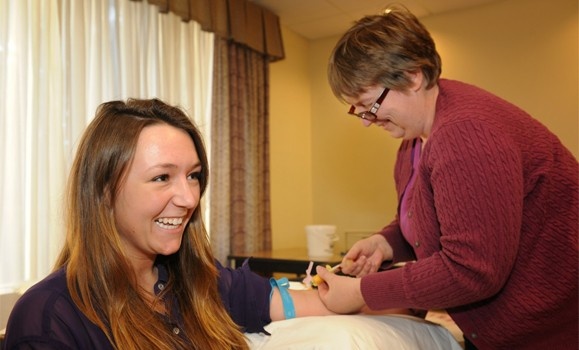It’s hands-on disease prevention — for a disease that, thankfully, may be close to running its course.
For the past 26 years, students in the School of Health and Human Performance’s Intro to Disease Prevention Class, currently taught by Lesley Barnes, have been hosting a public screening clinic for rubella, commonly known as the German measles.
"It's just a minor infection, in and of itself, but for pregnant women, it can have potentially devastating effects on a fetus," says Kim Devitt, a fourth-year health promotion student who's taking the class this year. Those effects, known as congenital rubella syndrome, can lead to children born with eye defects, low birth weight, congenital heart disease and more.
Thankfully, these days most women have grown up immune to the disease, as vaccination for rubella is part of the “MMR” vaccine that children receive, usually at 12 months and then again at 4-6 years. Still, Dr. Barnes says that when screening young women, up to 10 per cent may be non-immune.
"The idea is to target young women before they actually get pregnant,” says Brenda Rooney, a microbiology and immunology student taking the interdisciplinary class. “It’s driving home the prevention aspect: a lot of women don’t know what this is, or what to do.”
A smart screening
“A simple blood test tells women if they’re immune,” says Prof. Barnes. “If they are, it’s something they never have to be concerned about again.” She says that if women aren’t immune, they may want to have another vaccination to ensure they avoid any complications should they become pregnant.
The clinic, which attracted 75 Dal students on Tuesday afternoon, was entirely student organized: the students found the space, promoted the event, booked the nurses to conduct the screenings, and even baked so there would be edibles on hand after the attendees completed their blood tests.
“This is real hands-on promotion and prevention,” says Prof. Barnes. “I’m very proud of them.”
As the number of women who aren’t immune continues to drop, and as follow-up vaccinations for the disease — the one that happens at 4-6 years — becomes the norm, Prof. Barnes is hopeful that rubella will become a disease of the past. To that end, she says that this may have been the last year for the rubella screenings, and that she’s considering reworking the assignment next year to focus on a different public health issue.

